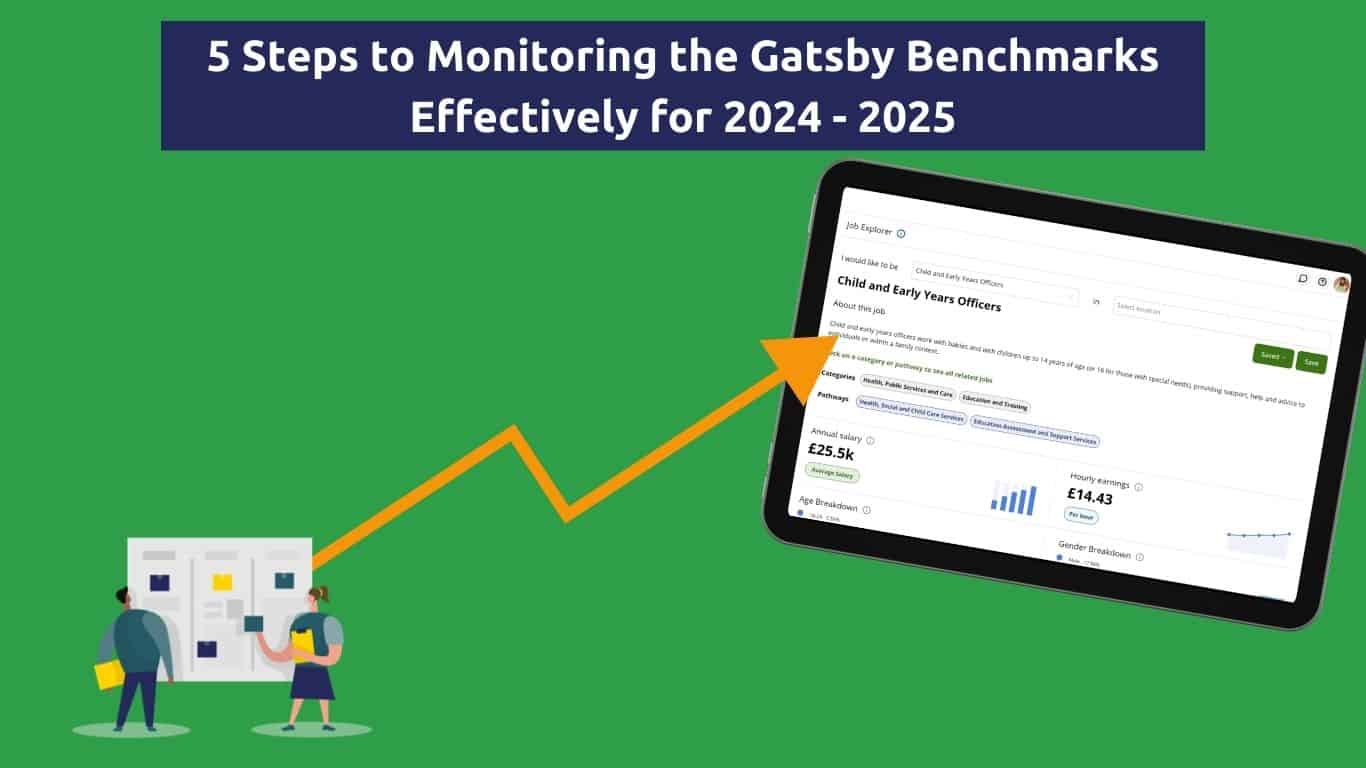As we move into the 2024-25 academic year, the Gatsby Benchmarks continue to be a critical framework for ensuring high-quality careers guidance in schools and colleges. However, monitoring progress against the benchmarks can be challenging when you already juggle many responsibilities.
Here, we outline five practical strategies to help you stay on top of these benchmarks so that you can deliver a meaningful careers education.
1. Set Clear Objectives for Each Benchmark
Before diving into the monitoring process, ensure that your careers strategy has clear, measurable objectives for each of the Gatsby Benchmarks.
By aligning your goals with specific, trackable outcomes, you’ll find it easier to gauge your progress. Consider breaking down each benchmark into smaller, manageable milestones.
Having SMART goals (Specific, Measurable, Achievable, Relevant and Time-bound) for each benchmark will provide structure and help keep your team focused.
For instance, if you’re working on Benchmark 3 (Addressing the needs of each student), you might track individual participation in careers activities and interventions across different demographics.
2. Use Data to Drive Your Careers Programme
Data is your most valuable tool when it comes to monitoring the benchmarks. Collect and analyse data on student participation, employer engagement and the outcomes of your careers programme. This will help you spot patterns, identify gaps and highlight areas where you’re excelling.
For example, when monitoring Benchmark 5 (Encounters with employers and employees), track how many employer visits or work placements each student has had. Reviewing this data regularly ensures that no students are missing out on vital careers experiences.
Ensure that your data is comprehensive, up to date and easy to access so you can quickly create reports for SLT, inspectors, or even governors.
3. Regularly Review Your Progress
A ‘set it and forget it’ approach won’t work for Gatsby compliance. Set regular intervals – ideally each term – to review your progress against each benchmark. This will enable you to adjust your careers strategy as needed and ensure that you’re on track to meet your targets by the end of the academic year.
During these reviews, involve key stakeholders from across your school or college, including subject leaders and pastoral teams. Their insights can help you identify areas where careers education can be further integrated into the curriculum, as required by Benchmark 4 (Linking curriculum learning to careers).
4. Collaborate with Employers and Alumni
Meeting Gatsby Benchmark 6 and 7 (Experiences of workplaces and encounters with FE and HE) often relies heavily on external relationships. Regularly engaging with employers, apprenticeship providers, colleges, and universities can help you keep your programme dynamic and relevant.
Maintaining strong communication with your external partners will also ensure you’re capturing the right feedback to demonstrate impact. Alumni networks can also be an invaluable resource – former students are often enthusiastic about sharing their experiences with current pupils, which can be particularly impactful for Benchmark 3.
5. Leverage Grofar’s Careers Management Platform
Tracking all the moving parts of your careers programme can be overwhelming. That’s where Grofar can help. Our comprehensive careers management platform is designed to support schools and colleges in monitoring progress across all Gatsby Benchmarks.
Grofar allows you to track individual student engagement, schedule and record careers activities and generate detailed reports, all in one place. Students can also log their own activities, ensuring no aspect of your careers programme is missed.
By using Grofar, you can save time and ensure that your careers strategy is organised, data-driven and compliant with the Gatsby framework.
In Summary
Effective monitoring of the Gatsby Benchmarks is crucial for ensuring students receive the careers guidance they need. By setting clear objectives, fostering collaboration with employers, and utilising tools like Grofar to review your progress, you can make the process much more manageable and impactful for your students.
Contact us now to discuss how Grofar can support your careers programme in 2024 – 2025.
